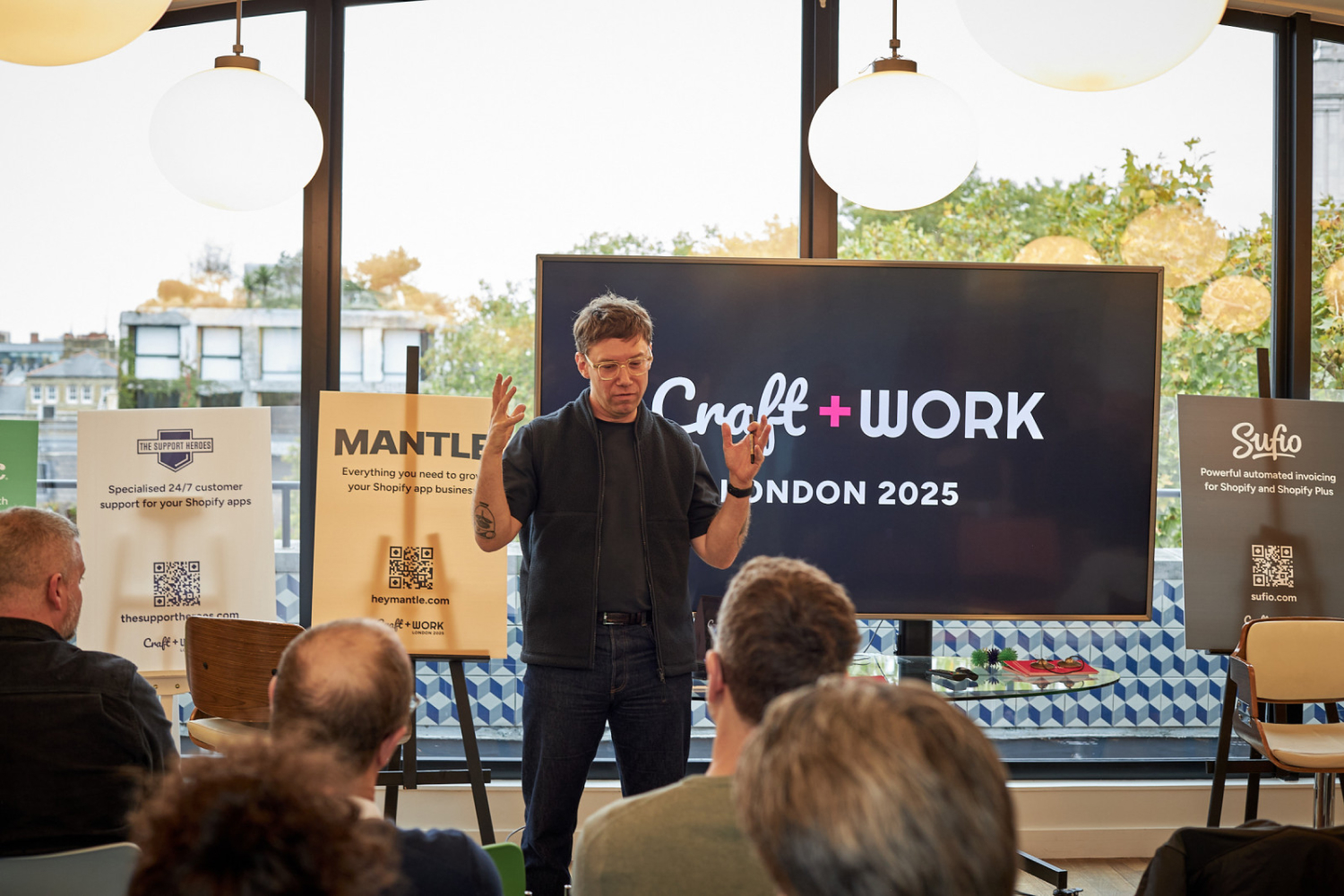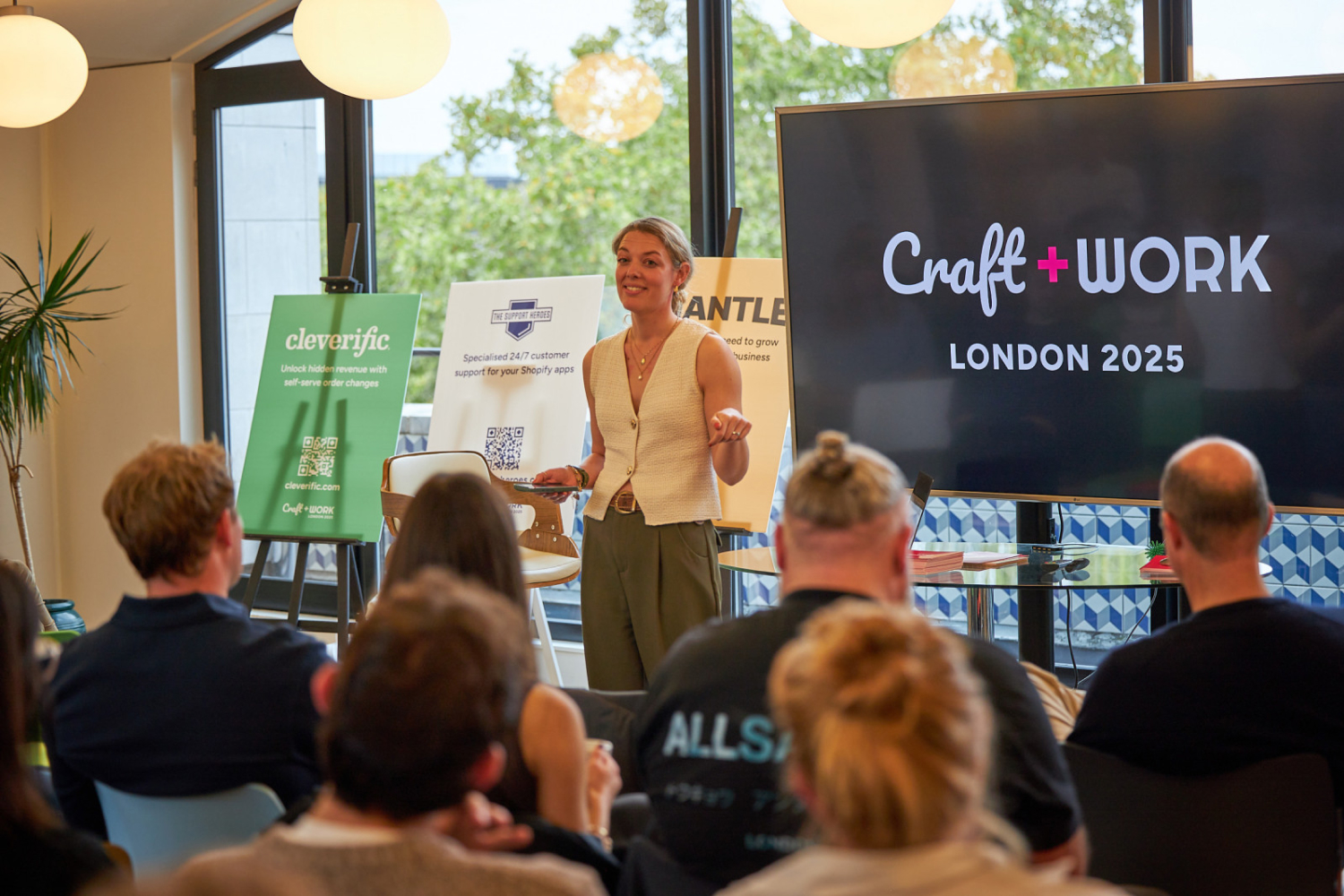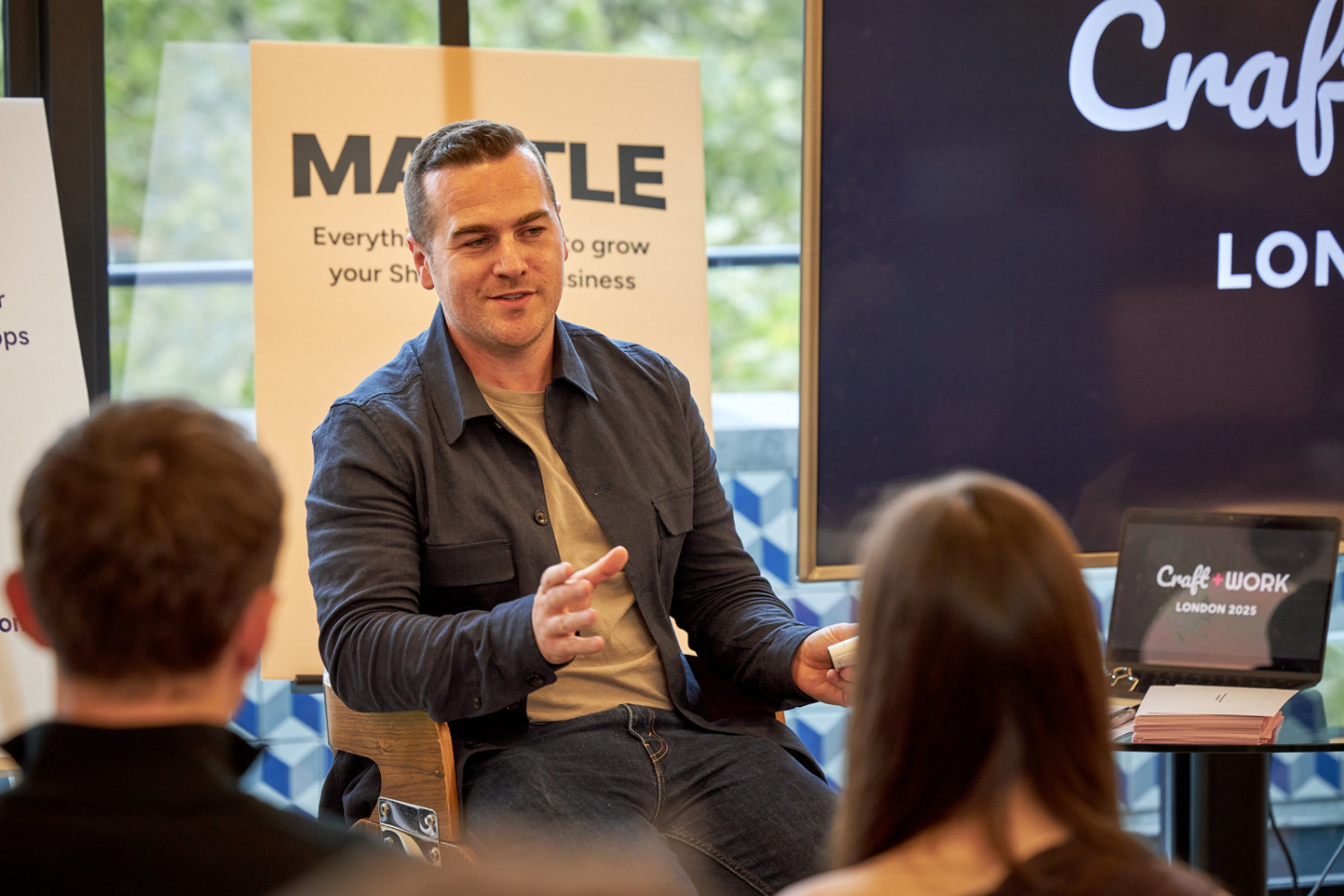London 2025 Key Takeaways
Saturday 4th October 2025Filed in: Craft+Work
This post comes courtesy of Oliver Lindberg, who joined us at Craft+Work: London 2025 and captured the key takeaways from the three guest presenters sessions — straight from the room.
AI in Commerce: Past, Present & Future

Tim Richardson (Photo: Marc Thiele)
Tim was back with his annual address — and yes, this year it was all about AI. From sceptic to reluctant maximalist, he shared how his views have evolved, what AI is already changing in our industry, and where it might take us next.
Key Takeaways
- Like many of us, Tim was initially anti-AI and thought it would go the same way as Web3.
- Tim then saw a paradigm shift: The future of consumer retail services will be human expertise coupled with practical use of AI.
- He pivoted (again!) and co-founded Factory, an AI-first commerce agency for D2C and multichannel brands focused on conversion, retention, and operational efficiency.
- Tim believes the next generation of companies will be AI-augmented, offering a mix of traditional services and AI.
- There are three types of companies: AI Curious, AI Forward, and AI Native. Most brands are in the Curious camp, the Forward ones are already seeing ROI, and the Natives are rare. However, Tim thinks the latter will be the next major shift in how modern brands operate: Thin human layers, thick AI stacks.
- Agencies need to decide whether to focus on AI externally or internally.
- Externally, they can offer AEO (Answer Engine Optimisation) or GEO (Generative Engine Optimisation), essentially enhanced SEO that can give clients tangible results and ensure their brands surface in the responses of AI tools like ChatGPT and Perplexity. A large percentage of Gen Z users already use AI platforms for product discovery over traditional search.
- Factory use AI search analytics tools like Hall, Profound, and Peec AI.
- Internally, agencies can use AI to target their business operations, ensuring they operate with more clarity, more speed, and fewer layers.
- In two years, websites will be driven by the needs and wants of consumers and feature agentic experiences to help them find what they're looking for.
- Be curious, experiment, and be okay with change.
Things I've Noticed about Marketing as a Marketer

Louise Gregson-Williams (Photo: Marc Thiele)
Louise works with founders and directors of B2B service-based businesses to figure out what marketing they actually need. Inspired by her newsletter No Silver Bullets, she shared five hard truths about marketing with us.
Key Takeaways
- You don't need a 90-page strategy to market your business.
- Don't spend too much time (e.g. 6 to 12 months) on coming up with a marketing strategy, while you could have been doing something more productive.
- Instead, know what you do, why you're doing it, and who's doing it.
- Further reading: How long should a good marketing strategy be?
- You don't have a marketing 'problem'; you have a commitment and prioritisation situation.
- It's not 'how good' you are at marketing that's holding you back. It's the lack of commitment to marketing that's holding you back.
- Commit to making marketing a proper priority in your business.
- Further reading: We're just no good at marketing.
- The messy middle — starting is easier than being consistent.
- Most of the momentum and excitement is at the beginning. The hard part of your marketing strategy is the middle, where you have to be consistent and repeat the same things over and over again.
- In the middle, you're starting to see results.
- If you're going to use words, make them count.
- Language is overlooked in marketing.
- Are you talking to your clients in a way they understand?
- As an industry, we've become very generic with our language, which has alienated us from what people really need.
- Broadstroke language doesn't allow us to differentiate ourselves.
- Consider what your clients think, feel, and do when they interact with your business and come up with some tangible examples.
- Further reading: It is what you say and how you say it.
- Metrics are pretty meaningless… let's focus on outcomes.
- Don't measure for measuring's sake. Metrics like the number of likes and followers your brand has are overrated.
- We celebrate metrics that make us feel good, rather than the numbers that actually grow our business.
- What matters is if you're converting customers and are achieving more sales.
- Are you getting lifetime value from a client, and do you have a pipeline of clients?
- Further reading: While you're celebrating 10,000 LinkedIn followers…
From Leading the Agency to Choosing the Agency

Dan Conboy (Photo: Marc Thiele)
Dan used to run an agency. Today, he supports brands in selecting one for their projects, working as an advisor and sitting in on agency pitches. He shared his top 5 observations of what agencies get right (and wrong) during pitches and what it takes to stand out in 2025.
Key Takeaways
- Knowledge before assumption
- Find out who will be in the room with you and what matters the most to them when you pitch.
- Be curious ahead of your pitch. Try to understand the key things that are on people's minds.
- Show, don't tell
- Start with a story to explain how you could bring a project to life.
- Consider creating prototypes that you could show to the client to connect with them.
- A good, memorable story is more powerful than a slide deck that looks like it was created 10 years ago.
- A truth well told
- The delivery and the detail of how you tell your story matters.
- Take the time to rehearse and create a narrative; take your client on a journey.
- Don't bring extra people without defined roles to the pitch.
- Authenticity and accuracy
- Give clear answers and be as precise as possible.
- Be yourself and your best self.
- Avoid blagging, as it signals that you haven't prepared well enough, which can affect a confident delivery.
- You have to have a position on AI
- Be able to explain the value that AI can bring to a project and the benefit it can have on the budget.
- You need to show a sense of capability, confidence, and clarity to signify to the client that they can trust you and they're in safe hands.
Also Filed in Craft+Work
Subscribe to Flying ✈️ Solo
Flying Solo is my email newsletter where I share my thoughts on marketing, building a solo business, and life in the Shopify Partner ecosystem — with the occasional detour into useful links, upcoming events, and honest behind-the-scenes lessons. It's 100% free and you can unsubscribe at any time. Read Issue #07 sent on 16 September 2025.